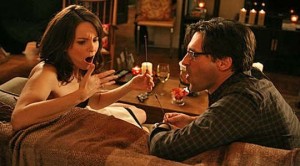A few weeks ago I attended the Writers Faire at UCLA. There were over 45 seminars on the craft of writing, presented by a humbling variety of the nation’s finest authors, poets and screenwriters—who just happen to teach at UCLA. (I’m salivating as I write this. I live just a few hours south–too far to attend classes in person, yet close enough to be heart-broken by this geographic tragedy. However, I will take advantage of the faculty’s 1-day and 4-day programs… and possibly its online offerings. More on that later.)
What I discovered at the event was an unexpected illumination of creativity spawned by the screen-writing instructors. I’d attended to learn more about the art of novel-writing, but ended up rapt by the pace and passion offered by the screenwriters, and have since been more open to finding inspiration in unexpected places. Janice Gable Bashman, co-author of the new book Wanted Undead or Alive: Vampire Hunters and Other Kick-Ass Enemies of Evil (Citadel Press, 2010) and contributing editor of the Big Thrill (the newsletter of the International
Thriller Writers) suggests we writers look to television of all places to learn more about shaping more captivating scenes, characters and storylines. Here is her advice:
1. Jump Right In—Television shows start smack in the middle of the action to grab and hold our attention from the get-go. This method discourages the viewer from flipping the channel to find something more interesting. Once we’re hooked, backstory is revealed. Tune in to any drama or even the news and you’ll see this method in action. Today’s readers expect the same from their books. They want to be hooked after reading that first paragraph, the first page, the first chapter. They want a book so exciting that they can’t put it down, a story that captivates their hearts and souls and fires up their imaginations. They want a story that pulls them into a new world and threatens to hold them there until the very last word. It’s up to writers to hook the readers, to keep them interested enough to keep reading. And it all begins with the first scene. Make it exciting.
2. Use Hooks and Cliffhangers—What keeps us hooked to television shows when the distractions of home,

family, friends, work, the Internet, etc. threaten to pull them away? It’s simple really. Good storytelling. But it goes beyond that. Just because it’s good doesn’t mean viewers will stay tuned, especially once a commercial comes on. Television shows tease us when going into a commercial or ending the show. They leave us hooked with an unfinished question or scene that makes the viewer want to know more and makes us wonder what will happen to the characters in the future. This process is a deliberate effort to keep us watching the shows. And it works. For writers, it’s important to begin and end a scene with a hook. It can be an unfinished question, a line of dialogue, or a bit of action—anything that grabs the reader’s attention and make the reader wonder what comes next. The hook compels the reader to turn the page and read more. As readers, we’ve all experienced that book that keeps us up well into the night when we have to get up early the next day. What keeps us reading each page, each chapter, when we know we should really go sleep? It’s simply a good story combined with great hooks.
3. A Break From Writing Is Not a Waste Of Time—We’ve all seen the television character who can’t solve a problem but who is then hit with a great idea while fiddling with the remote, hanging out with friends, playing basketball, or cooking. Some of the best ideas come to us when they’re least expected. Some writers believe that writing is the only way to find new ideas or resolve problems, but sometimes taking a step back from the process yields wonderful results.
4. It’s Not Always Best To Brainstorm Alone—Ideas don’t occur in a vacuum. Television cops don’t work alone, the women on “Army Wives” solve problems together, and the creative group on “Mad Men” is just that—a group of individuals who work together to brainstorm ideas. Many of the ideas are terrible and are rejected, but then a unexpected gem emerges from the give and take among the group members. When stuck for ideas or for solutions to plot problems, writers often stew in their chairs, surf the internet, knock out chores, or play games on the computer with the hopes that the solutions will magically appear. Sometimes it does; sometimes it doesn’t. Shooting an idea past a colleague or brainstorming with a friend can be just the thing to bring freshness and excitement to your work.
5. Diversification Is Key To Success—How many good television shows have gone stale? They show the same twist on an old story line over and over again. As a result, we become bored, abandon the shows, and find new ones to watch. Also, have you noticed how advertisers don’t focus on only one market? They diversify among television, print, radio, and the internet and adjust their advertising to each market to achieve the highest success rate and to reach the widest audience. As writers we must diversify in order to succeed in this ever-changing industry and to ensure our work is constantly in demand. If we focus on only one market and that market becomes stale or fails, we’re out of work. But if we diversify and continually look for new opportunities in untapped markets, the opportunities are endless.
What forms of media have inspired your writing, and how?

